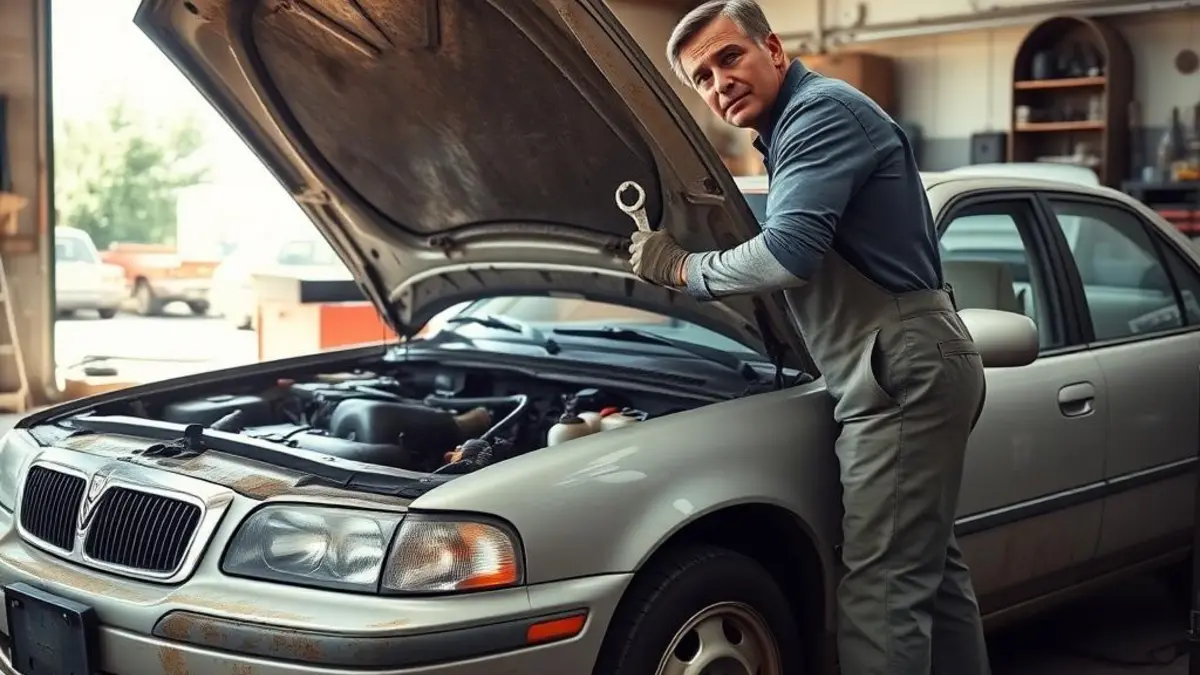Is Your Car Not Worth Fixing? A Step-by-Step Guide to Decide 2025 Update
- Repair Cost vs. Car Value Analysis
- Calculate your car’s current market value using KBB or similar tools
- Get detailed repair estimates (preferably from multiple shops)
- Apply the 50% rule: If repairs exceed half your car’s value, lean toward selling
- Long-term Ownership Math
- Add up annual maintenance costs over the past 1-2 years
- Estimate likely future repairs based on make, model, and mileage
- Calculate monthly cost of current car vs. potential replacement
- Consider remaining useful life of your vehicle after repairs
- Safety & Reliability Assessment
- Evaluate frequency of breakdowns over past year
- Consider safety implications of current mechanical issues
- Assess reliability for your specific needs (commuting, family transport, etc.)
- Determine if repairs will fully restore reliability or merely extend life temporarily
- Alternative Options Comparison
- Research cost of comparable used vehicles
- Calculate new car payment options and total ownership costs
- Compare selling your car as-is vs. after repairs
- Consider non-ownership alternatives like leasing or car sharing
This structured approach helps remove emotion from what is essentially a financial decision, though personal factors will still play a role. If you find yourself struggling with this decision, it may be time to practice saying “no” without guilt.
“A structured approach helps remove emotion from what is essentially a financial decision, though personal factors will still play a role.”
“Should I Sell or Repair My Car?” – Your Next Steps
Based on your analysis, one of these three options will emerge as your best path forward:
Option 1: When Repairing Makes Financial Sense
Repairing your car is typically the best choice when:
- Repairs cost significantly less than 50% of the car’s value
- The vehicle has been generally reliable with only occasional issues
- You’ve maintained the car well and major systems are in good condition
- The current problem is isolated, not part of a pattern of failures
- You’re emotionally attached to the vehicle and value its familiarity
In these cases, investing in repairs often provides the best return, especially if you plan to keep the car for several more years.
Option 2: When Selling As-Is Makes More Sense
Selling your car without fixing it is usually best when:
- Repair costs approach or exceed 50% of the car’s value
- Multiple systems are beginning to fail or show significant wear
- Your car has a pattern of recurring problems
- You’ve lost confidence in the vehicle’s reliability
- Market conditions make your car model valuable even with issues
When selling, compare instant online offers (from companies that buy cars in any condition) against private sale values.
Option 3: When Replacement Is The Smartest Move
Replacing your vehicle makes the most sense when:
- Repair costs significantly exceed 50% of current value
- Safety concerns exist that repairs may not fully address
- Frequent breakdowns are disrupting your life and work
- Total monthly cost of ownership for a newer vehicle is comparable or lower
- Your current vehicle no longer meets your needs (size, features, efficiency)
When considering replacement, calculate the total cost of ownership including payments, insurance, fuel efficiency differences, and expected maintenance. To determine if it is worth fixing your car, it is important to figure out the Transmission Rebuild Costs.
“Consider all the costs involved in owning a vehicle before making your decision to repair, sell, or replace.”
Tools & Resources for Your Car Decision
To help with your decision-making process, consider using these valuable resources:
- Repair Cost Estimators: RepairPal and YourMechanic provide model-specific repair cost estimates to help you determine if a repair cost exceeds car value
- Vehicle Value Tools: Kelley Blue Book, NADA, and Edmunds offer free valuation tools
- Instant Offer Sites: Peddle, Carvana, and CarMax provide quick online offers for cars in any condition see is it worth fixing your car.
- Total Cost of Ownership Calculators: Edmunds and KBB offer tools that project the five-year cost of ownership for potential replacement vehicles
These resources can provide objective data to support your decision when facing a car that may not be worth fixing.
Remember that online calculators provide estimates, and your specific situation may have unique factors that affect the outcome. Getting multiple professional opinions on major repair issues is always worthwhile. Avoid getting scammed by mechanics using AI.
“Make an informed decision based on data, not emotion.”
Conclusion: Making the Right Call on a Car Not Worth Fixing
Deciding whether to repair, sell, or replace a troubled vehicle ultimately comes down to numbers and your specific situation. The car repair decision checklist we’ve provided gives you a framework to make this choice with confidence.
Remember these key points:
- The 50% rule provides a useful starting point for your decision
- Consider both immediate repair costs and likely future expenses
- Factor in reliability, safety, and your specific transportation needs
- Use available tools to get accurate estimates for all options
Whether you choose to fix your current car, sell it as-is, or upgrade to something more reliable, making an informed decision based on data rather than emotion will serve you best financially.
Don’t let a car that’s not worth fixing continue draining your bank account. Use this guide to evaluate your options, then take decisive action toward the solution that makes the most sense for your situation. If you’re ready to start looking at something new, check out our tips for extraordinary journeys.
FAQ
Q: When does the 50% rule apply?
A: The 50% rule applies when repair costs are close to or more than half of the current market value of your car.
Q: What if I’m emotionally attached to my car?
A: While emotional attachment is normal, try to focus on the financial and practical aspects to make an informed decision.
Q: How can I sell my car as-is?
A: You can sell it online through websites like Peddle or Carvana or try selling it privately.
-

 Best Picks1 year ago
Best Picks1 year agoDriving Insurance: Get the Best Car Coverage Without Overpaying
-

 Best Rewards7 months ago
Best Rewards7 months agoBest rewards credit cards in 2025 for everyday use
-

 Personal Growth & Mindset1 year ago
Personal Growth & Mindset1 year agoTed Lasso Effect: 5 Goal-Setting Secrets You Must Know
-

 Personal Growth & Mindset1 year ago
Personal Growth & Mindset1 year agoMachado de Assis: This Viral TikTok Explains Why You Need to Read ‘The Posthumous Memoirs of Brás Cubas’ Now
-

 Career & Success1 year ago
Career & Success1 year agoChallenges of Not Having Goals: 5 tips to help you get started
-

 AI & Future Trends1 year ago
AI & Future Trends1 year agoAI in Time Management 2024: A New Era of Productivity for Business Leaders








